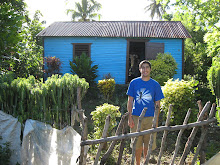
I can hear the questions now, bearing down on my being like a winter snow in Nueva Yol.
“Wow, two years! That’s a long time. What was it like?”
“ Well, that’s sort of a complicated question. I learned a lot, I guess, and I had all these great experiences, and I tried to help—“
“That sounds great. Did they have real food there? Haha! And I can’t believe you were without electricity all the time. How did you live?”
“Um, it really wasn’t that bad…”
And repeat. Ad nauseum. Until all I want to do is go back to my campo, where people asked me where I was and if it rained there, because they really wanted to listen the answers. And when I didn’t want to hear anymore I could remove myself to my house, close my door (or leave it open for the brisita), turn on my iPod and lie with my shirt off on the cool cement floor, praying for rain to hear the light patter of drops on my roof. And all would be good.
But this will not be my reality now. My reality will be far, far away from the breeze coming off the conuco, the mound of rice and beans for lunch, the naked screaming children. I won’t be able to hide in my house, because my house will not be mine, but I will also not be able to go next door, welcomed with a smile and kiss, and be fed lunch with the family. This is not to say I am not looking forward to being back. In the course of writing this, a scorpion ran across my keyboard and jumped onto my leg. That sort of thing will not be missed. I look forward to seeing my friends and family, my native land. I look forward to the comforts of developed-world life. But after living here, I appreciated so much more everything that we take for granted in the States.
Take electricity, for example. I am not fool enough to say that life is better when we don’t have it all the time; I appreciate this situation from a rich-world point of view. I understand electricity as a necessary condition for economic growth and for basic household comforts. Yet for someone who never knew life without electricity except for the rare winter-storm blackout, it was an opportunity. When there is no luz, people often move outdoors. Families are forced to spend time together, to talk to each other. At night, the moon lights our faces, and we admire the stars. I hope that sometime soon, EDENORTE gets its act together and provides sufficient electricity to its clients. But this was an opportunity for us, and I hope that we all took advantage of it. I hope we also understood that although for us this was a two-year stint in the campo (or pueblo), that this is the permanent situation for our friends and neighbors, and what that means for us and for them.
To get back to the original question posed by my imaginary American: What was my time as a Volunteer actually like, then? A simple summary would never do, it cannot capture two years. I could tell some funny stories, although as we like to say, our entire lives here are funny. I might show some pictures, but they do not tell the whole story. Unless they were here, they do not understand. We worked too hard, gave too much of ourselves, learned too much, (and took necessary of time off), for our experiences to be distilled until meaningless. A lack of luz, a week of sickness, a failed project attempt, these must be placed in context, or we risk misunderstanding what they signify. I cannot attempt to define my Volunteer experience here. I could never do it justice, nor would it speak to exactly what your experiences were either.
As I plan to exit the country at the end of the month, I realize that I am not really leaving the Peace Corps; I am hardly leaving the Dominican Republic. There is so much of this place I am taking back with me, from the unwanted, perhaps a parasite bien metido in my intestine, to the valued, like photos that probably shouldn’t be posted on the Internet. I will do my part of Third Goal activities in America, I will remember why I came and why I stayed, and who knows, I might be back someday to steal Romeo’s job. It seems pretty good right now.

